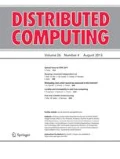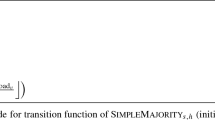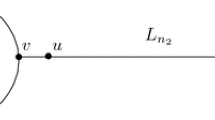Abstract
We describe and analyze a 3-state one-way population protocol to compute approximate majority in the model in which pairs of agents are drawn uniformly at random to interact. Given an initial configuration of x’s, y’s and blanks that contains at least one non-blank, the goal is for the agents to reach consensus on one of the values x or y. Additionally, the value chosen should be the majority non-blank initial value, provided it exceeds the minority by a sufficient margin. We prove that with high probability n agents reach consensus in O(n log n) interactions and the value chosen is the majority provided that its initial margin is at least \({\omega(\sqrt{n} \,{\rm log}\, n)}\). This protocol has the additional property of tolerating Byzantine behavior in \({o(\sqrt{n})}\) of the agents, making it the first known population protocol that tolerates Byzantine agents.
Similar content being viewed by others
References
Alon N. and Spencer J.H. (1992). The Probabilistic Method. Wiley, New York
Angluin D., Aspnes J., Diamadi Z., Fischer M.J. and Peralta R. (2006). Computation in networks of passively mobile finite-state sensors. Distrib. Comput. 18(4): 235–253
Angluin, D., Aspnes, J., Eisenstat, D.: Fast computation by population protocols with a leader. In: Distributed Computing: 20th International Symposium, DISC 2006: Stockholm, Sweden, September 2006: Proceedings, pp. 61–75 (2006)
Angluin D., Aspnes J., Eisenstat D. and Ruppert E. (2007). The computational power of population protocols. Distrib. Comput. 20(4): 279–304
Aspnes J. and Ruppert E. (2007). An introduction to population protocols. Bull. Eur. Assoc. Theor. Comput. Sci. 93: 98–117
Chow Y.S., Robbins H. and Siegmund D. (1991). The Theory of Optimal Stopping. Dover, New York
Ezhilchelvan, P., Mostefaoui, A., Raynal, M.: Randomized multivalued consensus. In: ISORC ’01: Proceedings of the Fourth International Symposium on Object-Oriented Real-Time Distributed Computing, p. 195. IEEE Computer Society, Washington (2001)
Feller W. (1958). An Introduction to Probability and its Applications, vol. 1, 3rd edn. Wiley, New York
Gillespie D.T. (1977). Exact stochastic simulation of coupled chemical reactions. J. Phys. Chem. 81(25): 2340–2361
Gillespie D.T. (1992). A rigorous derivation of the chemical master equation. Physica A 188: 404–425
Grimmet G.R. and Stirzaker D.R. (1992). Probability and Random Processes, 2nd edn. Oxford Science Publications, Oxford
Kurtz, T.G.: Approximation of Population Processes. No. 36 in CBMS-NSF Regional Conference Series in Applied Mathematics. Society for Industrial and Applied Mathematics, Philadelphia (1981)
Mostefaoui A., Raynal M. and Tronel F. (2000). From binary consensus to multivalued consensus in asynchronous message-passing systems. Inform. Proces. Lett. 73(5–6): 2007–212
Wormald N.C. (1995). Differential equations for random processes and random graphs. Ann. Appl. Probab. 5(4): 1217–1235
Author information
Authors and Affiliations
Corresponding author
Rights and permissions
About this article
Cite this article
Angluin, D., Aspnes, J. & Eisenstat, D. A simple population protocol for fast robust approximate majority. Distrib. Comput. 21, 87–102 (2008). https://doi.org/10.1007/s00446-008-0059-z
Received:
Accepted:
Published:
Issue Date:
DOI: https://doi.org/10.1007/s00446-008-0059-z




